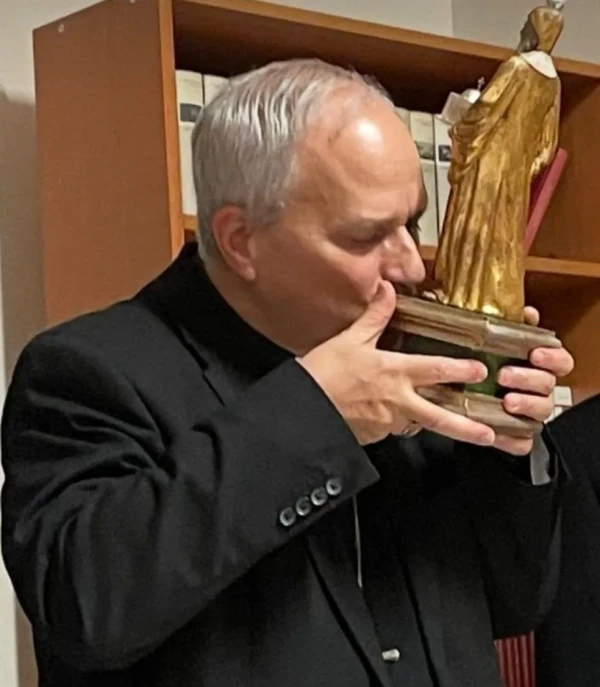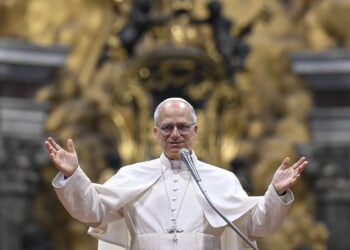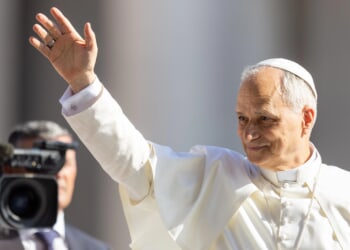ACI MENA, May 17, 2025 /
08:00 am
Eastern Christian communities erupted in celebration at the election of the Catholic Church’s new pontiff on May 8, with joyful speeches and church bells ringing. However, many wondered about Pope Leo XIV’s connection to the East, given his North and South American roots and his affiliation with the Augustinian order — a community not widely known in the Arab world.
Spiritual son of an Algerian saint
In his first address from St. Peter’s Basilica balcony on May 8, Pope Leo XIV introduced himself by saying: “I am a son of St. Augustine, an Augustinian.”
St. Augustine was born in Tagaste, Algeria (modern-day Souk Ahras). He taught in Carthage and later served as bishop of Hippo (now Annaba), where he lived, ministered, and was buried.
The Augustinian order, to which the new pontiff belongs, derives its spiritual foundation from St. Augustine, who became a doctor of the Church. The order’s guiding principles emphasize love for the Church, service, fraternity, and unity. The order seeks God through worship and ministry, aiming to transform the world from within and spread the Gospel. Key pillars of this spirituality include missionary work, prayer, development, and reflection on contemporary issues.
A likely influence
Before his election, Pope Leo XIV headed the Vatican’s Dicastery for Bishops, the office responsible for selecting bishops and apostolic administrators. The dicastery evaluates candidates’ qualifications and assesses their spiritual, theological, and administrative capacities. In this role, Pope Leo XIV is believed to have influenced — either directly or indirectly — the 2023 appointment of Bishop Hanna Jallouf as apostolic vicar of Aleppo.
Relic of St. Maron and prayers in Arabic
Several months ago, the newly-elected pope visited the Maronite College in Rome, where he discussed relations with Eastern churches and the concept of communion. At the conclusion of the meeting, college officials presented him with a relic of St. Maron and a statue carved from cedarwood.
Additionally, the Peruvian newspaper La República quoted an Augustinian priest stating that Pope Leo XIV kept a small slip of paper with prayers written in Arabic.

Champion of peace and the Syrian people
In his first address, the word “peace” appeared 10 times, with the pope opening his speech by saying: “Peace be upon you all.” This phrase underscores his vision for his pontificate, particularly regarding conflict zones in the Middle East and Ukraine. It also serves as a reminder of Christ’s Eastern roots.
Although many associate “Peace be upon you” with Islamic traditions, the greeting predates Christianity and was traditionally used to offer reassurance and goodwill.
In a similar vein, Pope Leo XIV re-shared an image on his X account of Syrian child Omran Daqneesh, who was rescued from rubble due to the conflict there. The image was accompanied by words from a Jesuit priest: “Are we shutting our doors to all Syrian refugees? Men, women, and the most vulnerable children? What an immoral nation we have become. Jesus weeps.”
Quoting a Syrian saint in his first Mass
(Story continues below)
Subscribe to our daily newsletter
During his first Mass held May 9 at the Sistine Chapel, Pope Leo XIV concluded his homily with a quote from St. Ignatius of Antioch’s “Epistle to the Romans”: “I will truly be a disciple of Jesus Christ when the world will no longer see my body.”
He explained that no leader in the Church can disregard this profound meaning. He also emphasized that the Church of Rome is called to lead the universal Church “with love,” as expressed by St. Ignatius in the introduction to his letter.
This story was first published by ACI MENA, CNA’s Arabic-language news partner, and has been translated for and adapted by CNA.


















